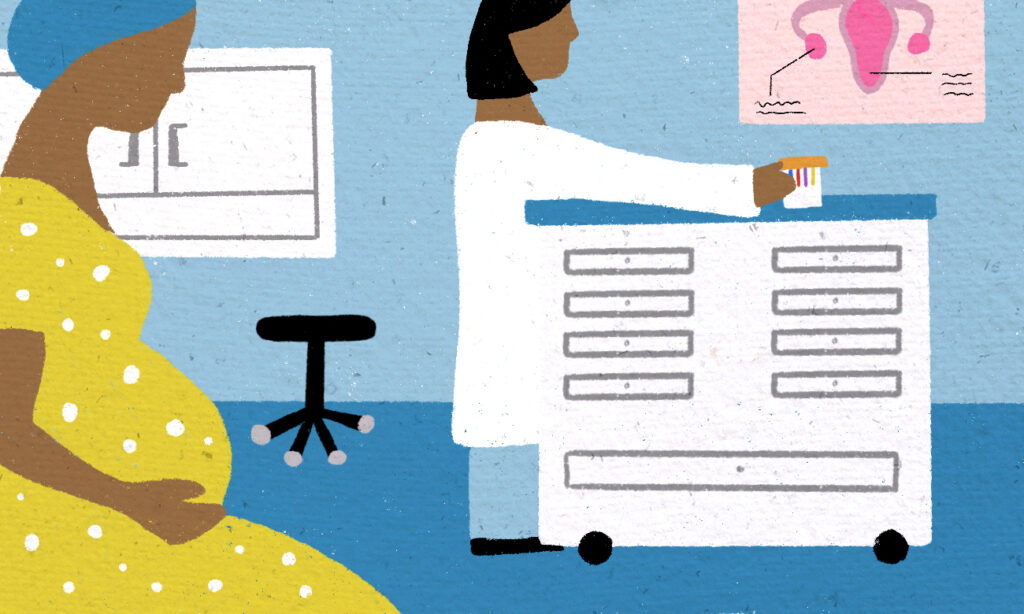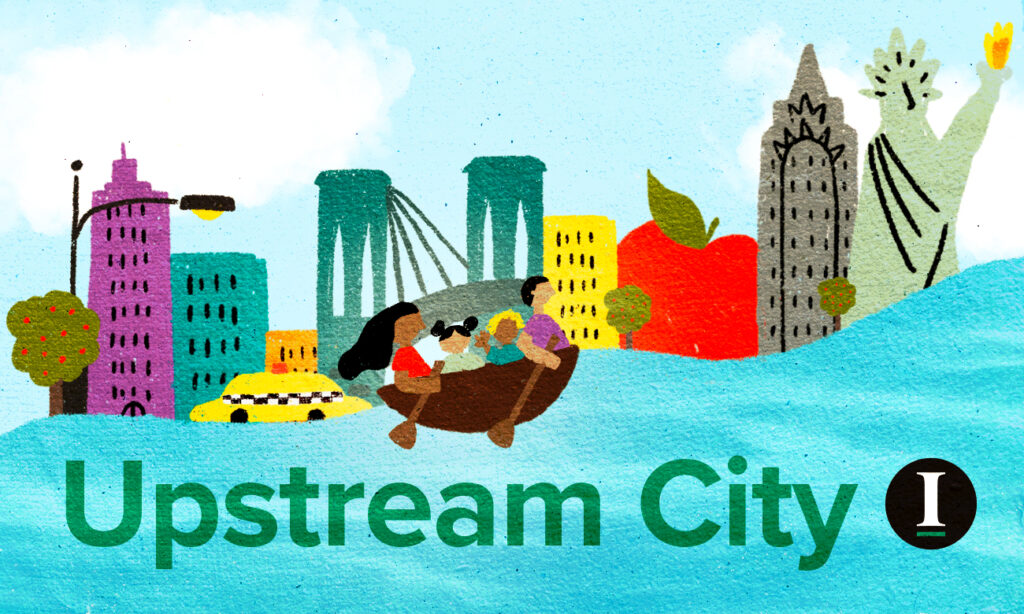Advocates want women statewide to be informed and agree to maternal and infant drug tests

In a series of social media posts launched today, women cradle their pregnant bellies. They kiss their newborns and lovingly nurse their tiny infants.
“Black mamas deserve quality healthcare and unconditional support,” the messages spread by a campaign of New York advocates for low-income parents and families state. “We must make healthcare safe for birthing people at all times.”
The coalition behind the social media blasts has a broad goal: halting the separation of women who test positive for drugs and their newborns, and refocusing interventions on what’s most needed — better health care and support. The “Reimagine Support” campaign is led by the Bronx Defenders legal aid firm, the advocacy group JMacForFamilies, the NY Drug Policy Alliance and the Movement For Family Power.
Specifically, coalition members are pushing for passage of a Senate bill that would require pregnant and postpartum mothers provide “meaningful consent” before they are tested for drugs in clinics and hospitals statewide. They say non-consensual drug testing continues to violate the reproductive rights of too many women, while dismissing substance use disorder as a health condition. The practice also exacerbates the “womb-to-foster-care pipeline,” advocates say, and “threatens the health and well-being” of new mothers and their babies.
“A positive toxicology doesn’t say what kind of parent you are, it doesn’t say how much you love your child,” said Miriam Mack, policy counsel for the family defense practice at the Bronx Defenders. “All it says is that there’s the presence of a drug metabolite in your system.”
New York Senate Bill 4821 is sponsored by Sen. Julia Salazar (D). Assemblymember Linda Rosenthal (D) first introduced the Assembly version of the bill in 2019.
New York City Democrats have attempted to get a similar bill passed in previous years, requiring all health care providers to receive written and verbal consent from pregnant or perinatal women before any testing for drugs or alcohol is done.
The legislation is being proposed again this year, amid heightened organizing efforts and greater pushes for parents’ legal rights. It would also require health professionals to provide a description of the test being administered and inform patients that the test is voluntary and could result in a report to child protective services; and prohibit doctors from denying patients medical care if they refuse a drug or alcohol test.
Final bills must be approved by New York lawmakers by June 2.
SB 4821 has some prior momentum to draw upon. In 2020, NYC Health + Hospitals issued a new policy for all public hospitals and clinics in the city, requiring that pregnant patients be informed about drug testing and provide their consent. The updated operating procedures directed health care providers to treat substance use as a medical condition and not a “moral problem.”
The policy requires that toxicology tests be provided only when necessary, with written consent of the patient, or in an emergency when used for treatment or diagnosis. It also states that the provider must inform the patient that the test is voluntary, unless needed for an emergency. According to the policy, if the patient refuses to provide written consent in non-emergencies, a test cannot be performed, but a refusal can be documented in medical records.
Campaign members want similar policies statewide. They are propelled by years of advocacy and activism in New York — where in 2020 Black children made up more than one-third of those in foster care, despite the fact they represented just 15% of the state’s child population. Backing is widespread they say, including nurses, doctors, OB-GYNs, doulas, midwives and even social workers, who also decry the high numbers of bonds shattered by CPS reports mere hours and days after women have given birth.
The problem is more acute now than ever, the activists’ social media campaign states, with Black women facing “obstetric violence,” and “medical racism” when COVID-19 has exacerbated health disparities: “The pandemic made clear that our healthcare system is broken. At a time where families needed healthcare and support the most, hospitals increased surveillance and policing.”

The coalition aims to end what it describes as the harmful practice of hospitals making child maltreatment reports to the state hotline when women receive positive toxicology tests, often conducted without their knowledge or consent, advocates for mothers say. Those reports result in CPS investigations that can lead to newborns being taken from their mothers at a critical bonding stage, and extensive emotional harm thereafter.
Although common nationwide, the resulting separation would be almost unimaginable for most mothers, as Mack described it: A worker at a woman’s hospital bedside “telling them that there’s an investigation because there was a positive toxicology report, and now they may not be able to leave the hospital with their children.”
Responding to requests for comment from The Imprint, Stephanie Gendell, spokesperson for the Administration for Children’s Services, said her agency along with the city’s health department, is committed to providing New York City families with the necessary support to ensure parent’s rights are protected in all interactions with the health care and child welfare systems.
“We support informed consent for drug testing of both mothers and babies,” Gendell stated, adding that the campaign “preserves the necessary trust between a pregnant or perinatal person and their medical provider.”
Jeannine Smith, spokesperson for the state’s Office of Children and Family Services said her agency does not oversee testing of pregnant people or newborns but “remains committed to promoting racial equity in all aspects of our work with children, youth and families, including vulnerable populations.” Smith also said in response to new cannabis legalization laws, her agency has updated its policy on reports to the Statewide Central Registry of Child Abuse and Maltreatment. As a result, positive toxicology reports for a mother or child solely for marijuana use are no longer registered.
According to an article published in the international Child Abuse & Neglect journal in 2018, infants have the highest rates of maltreatment reporting and entries to foster care, with parental substance abuse an influential factor in such “common pathway” cases.
The study examined birth, hospital discharge and CPS records from California related to “medically diagnosed substance exposure and neonatal withdrawal disorders.” Among more than 550,000 babies born in 2006, almost 8,000 were drug-exposed at birth. Of those diagnosed, more than one half were reported to CPS before age 1 and nearly one-third placed in foster care. The study concluded that future research is needed to examine the longer-term trajectories of these babies and the role CPS played in their lives.
Activists say marginalized populations, who are overwhelmingly people of color, are disproportionately impacted by these foster care removals, and they say there are less harmful routes to healing for these families than the foster care system.
Indeed, a study published in 2007 examined testing for illicit drugs and how it may “expose women who test positive to severe legal and social consequences.” The study noted that it is unknown whether there are racial disparities in maternal and neonatal drug testing practices. Yet of 8,487 women studied, the Journal of Women’s Health article found that Black women and their newborns are 1.5 times more likely to be tested for illicit drug use compared to their nonblack counterparts.
Notably, however, the study found that race “was not independently associated with a positive result.”
Drug testing methods vary, but urine samples are described as the most common method relied upon — similar to samples pregnant women provide periodically throughout their pregnancies at prenatal office visits. Newborns are tested through urine and meconium samples. In moms, urinalysis exams test for sugar, protein, bacteria and blood cells, which can determine if there is a risk of a urinary tract infection, gestational diabetes or preeclampsia.
Some expectant mothers, however, say they were not properly informed and did not give consent for their urine to also be tested for drugs and alcohol.
A Bronx mother who spoke to The Imprint in 2020 described how the hospital where her baby was born didn’t explain why they were testing her daughter. Marlena, who declined to share her last name for fear of retribution from CPS, said she used marijuana for pain management after a difficult surgery. After being discharged, Marlena said child welfare workers required her to leave her home and hand over the baby to her father, or face losing her to foster care.
“The doctor told me this happens all the time,” the Bronx mother said.
New York is one of nine states where evidence of a positive toxicology report does not substantiate the basis for a child abuse or neglect case — under current law, there must be evidence of actual harm or risk to the child. But family attorneys say they still continue to represent mothers who are separated from babies shortly after giving birth.
In 2017, one in four cases where a child was removed from their parents involved allegations of parental drug use, according to data from New York City’s Administration for Children’s Services. That same year, of the 6,000 parents investigated in the Bronx for child maltreatment due to drug use, 462 were pregnant women. In those cases, 70% of CPS investigations resulted in substantiated findings, city data show.
Attorneys representing children and parents say the harm of non-consensual drug testing and reports to CPS in hospitals is far-reaching, particularly for Black women who are those most likely to be poorly served by the health care system. Broken trust and relationships with medical providers are among the common outcomes.
Dr. Mishka Terplan, an OB-GYN and addiction medicine specialist who focuses on the intersections of reproductive and behavioral health, told The Imprint that the type of drug test used also matters, in terms of accurate readings and fairness.
A “presumptive” test or “point of care” — most commonly used because the results are produced faster — identifies the use or non-use of a class of drugs. A “definitive” test is more specific, detecting a specific drug or metabolites, he said, but takes longer to produce results.
Attorney Mack said tests relied upon to make decisions in foster care cases are typically the less accurate presumptive type. “Oftentimes, the drug test results have written on them that they should not be relied upon for legal purposes,” she said. “Yet, Family Courts and family regulation workers routinely rely on them.”
In fall 2020, the city’s Commission on Human Rights launched an investigation into three hospitals to see whether Black and Latino pregnant mothers and newborns were being targeted for drug testing, assessing if they were subject to racial bias and discrimination. Findings on Montefiore Medical Center, Mount Sinai Health System and New York-Presbyterian — which have facilities across four of the city’s five boroughs — have yet to be released.
Meanwhile advocates for Black mothers say their campaign aims to protect far-reaching reproductive rights, for all pregnant and parenting state residents. They are calling for supportive, treatment-focused services — not the punitive practice of family separation.
“It is a reproductive justice issue,” Mack said, “it’s about the right to have children and to raise those children with dignity.”





